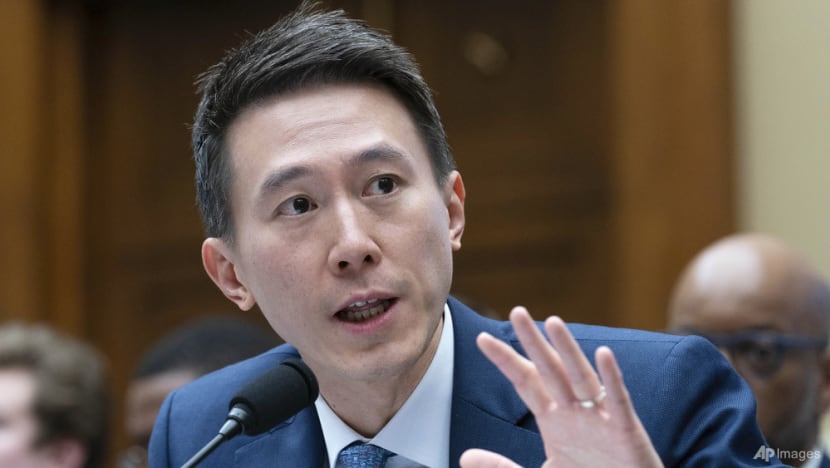Commentary: What was it about TikTok CEO Chew Shou Zi’s speech that made him sound un-Singaporean?
TikTok CEO Chew Shou Zi’s use of American features in his speech at a hostile congressional hearing was not only polite, but also necessary, says linguistics expert Associate Professor Tan Ying Ying from NTU.

TikTok CEO Chew Shou Zi testifies during a hearing on the platform's consumer privacy and data security practices and impact on children on Mar 23, 2023, on Capitol Hill in Washington. (File Photo: AP Photo/Jose Luis Magana)
SINGAPORE: TikTok CEO Chew Shou Zi was put under the international spotlight on Mar 23 as he was grilled for five hours by the United States Congress about the social media app’s alleged links to China, data collection process and various other concerns, including child safety.
As the world followed the hearing with much interest, in Singapore, we saw Singaporeans scrutinising Chew's accent and questioning how Singaporean he really is.
A few online commentators thought Chew does not have a prototypical Singaporean accent, and offered samples of the “real” Singaporean accent. Some went as far as to say Chew is in fact from China as he sounds like a Chinese national who has received an American education.
As a linguist working on accents, I watched the hearing and followed the subsequent debates with much interest. What was it in Chew’s speech that made him sound un-Singaporean?
TOMAYTO, TOMAHTO
It is apparent that Chew had some distinctive American English features in his speech. His carefully practised introduction and prepared defence statements were littered with the postvocalic-r, one of the most distinctive features of American English.
The postvocalic-r is the articulation of the “r” sound at the end of words like “car” and “star”.
Most Singaporeans do not do this, but when they do, they may do it with the intention to sound more “American”.
Past research, my own included, has also shown that the postvocalic-r has been perceived as a prestige marker, and speakers of English may use the postvocalic-r deliberately to sound more “educated” or “high-class”.
Chew was also consciously using American pronunciation on certain vowels. The most obvious was the vowel in “dance”. While most Singaporeans would pronounce the word “dance” with the same sound as we would in the vowel of “car”, Chew instead pronounced it with the vowel like we would in the word “can”.
While these Americanised features may sound jarring and unnatural to some, there are many reasons to explain his speech patterns. Of course, we cannot discount personal circumstances. He has a Taiwanese-American partner, and he did a stint of his higher education in the US. The family environment and one’s educational journey are strong factors that influence one’s accent.
Personal reasons aside, there are also important strategic motivations to explain his use of American speech features.
Let us all remember that Chew was speaking to a group of American Congressmen and women. He was fighting for the survival of TikTok, and that responsibility sat squarely on his shoulders. He had to make sure that he was unequivocally understood. And more importantly, he needed to connect with these people who were grilling him, and as much as possible, even be liked by them.
PEOPLE ACCOMMODATE BECAUSE THEY CAN
We not only use language to communicate, we also use language to strike rapport. We do this by assimilating to the speech patterns of our speech partners. This process is called linguistic accommodation. We perform linguistic accommodation by adjusting our accents, or changing our speech style, based on what we think our interlocutors will understand or prefer.
Linguistic accommodation happens all around us, and we do it more often than we realise. We tend to speak a little slower, or use simpler words, when we know our speech partner may not be as proficient in the language as we are. Some people try to speak with a more “international” accent when addressing foreigners. We do this because we are considerate of our speech partner, and it is good linguistic etiquette to do so.
Chew’s use of American features in his speech therefore can be seen as not only polite, but also necessary, especially since he had to convince the hostile lawmakers that he, and by extension, TikTok, was not as un-American as the group perceived him to be.
As the hearing wore on, it became very clear that Chew’s linguistic accommodation did not achieve the intended outcome. Some of the Congressmen and women insisted that he was from China, and linked him to the Chinese Communist Party.
It was particularly heartening to see Chew defend himself and declare his Singaporean nationality then. And it was also in those moments that he spoke in a Singaporean accent without the Americanised speech features. There was no longer a need to accommodate, especially when it was not appreciated.
You may ask at this point: Why then must the Singaporean do the linguistic accommodation? Why don’t the Americans try to sound Singaporean and accommodate Chew?
The answer is very simple. Like many Singaporeans, he accommodated because he can. We should be very proud of our ability to do so, and feel sorry for those who can’t.
Dr Tan Ying Ying is Associate Professor of Linguistics and Multilingual Studies at the School of Humanities in Nanyang Technological University. She is a Singaporean linguist working on languages in Singapore.















